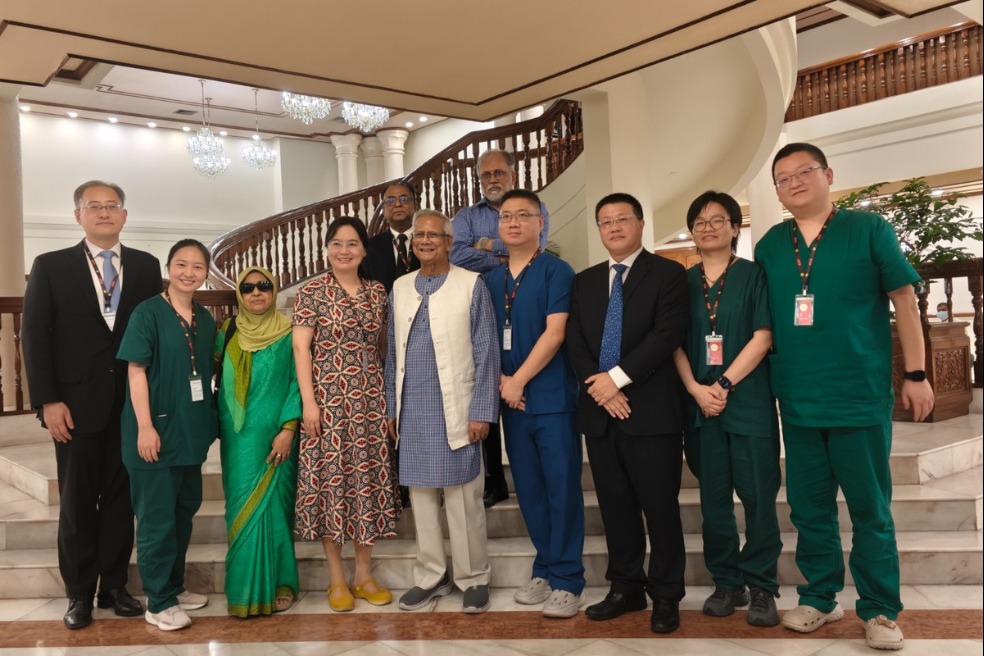Innovation to power China growth
Digital sector, green industries driving forces moving forward, scholars say

Innovation capacity, the digital sector and green industries have significant potential to be major engines of China's growth, fueled by the nation's commitment to reform and opening-up, said Japanese scholars.
Hidetoshi Tashiro, chief economist at Japan's Infinity LLC, predicts that China's economy is poised to enter a new phase of growth.
Speaking at a seminar on Chinese-style modernization in Osaka last week, Tashiro highlighted China's significant share of the global market in various industries. While noting the nation's leading position in sectors such as electric vehicles and solar panels, he also said that as digitalization expands globally, demand for products and services supporting this shift will continue to rise.
Tashiro stressed the digital sector is the key driver of China's economic growth. Reflecting on his visit to China last November, he observed that cash payments had become obsolete in the nation.
"The rise of this vast digital ecosystem, unlike anything the world has ever seen, is now powering China's economy. This momentum is driven by advancements in semiconductor design and application development," Tashiro said.
A World Intellectual Property Organization report shows that from 2014 to 2023, China-based inventors filed more than 38,000 generative artificial intelligence patents, six times the number filed by inventors in the United States.
China's economy is shifting from a labor-intensive to a capital-intensive model, making intellectual contributions increasingly important. The country is producing a huge number of highly-skilled scientists and engineers, fostering the growth of a vast and expanding digital ecosystem, he added.
Yangchoon Kwak, a professor at Rikkyo University's College of Economics, emphasized that green industries will be the main driver of China's future economic growth.
"China's focus is not just on quantitative expansion but on pursuing environmentally-friendly development that contributes to global peace and prosperity," Kwak explained.
Another key growth area is tourism. With a history spanning several millennia, China has a rich cultural heritage to share with the world. If the nation continues to open up, it could attract more than 100 million visitors, fostering a deeper international understanding and appreciation of the country, he said.
"China's dynamism will continue to accelerate, and it's vital for Japanese companies to seize this opportunity," Kwak added. He advised them to engage in proactive capital and technology partnerships with China, aligning with the country's evolving trends, rather than focusing on low-cost labor as they did in the past.
Confidence emphasized
Satoshi Tomisaka, a professor at the Institute of World Studies at Takushoku University, emphasized the importance of fostering an environment in China where people feel confident in their spending.
"As Western economies face stagnation and institutional difficulties, China's model is starting to make a significant global impact," said Tomisaka.
However, for the world to truly acknowledge China's achievements, soft power is crucial. International recognition would not only elevate China's global reputation but also strengthen its domestic standing, he added.
Kiyoyuki Seguchi, research director at the Canon Institute for Global Studies, said that the future of China's economic growth will be driven by the innovation capacity of its companies. If policies continue to energize private companies, China still has significant potential for further growth, he added.
Seguchi's remarks came after a recent lecture in Tokyo organized by the Japan-China Belt and Road Initiative Promotion Association.
The foundation for China's growth is rooted in its reform and opening-up policy. Seguchi emphasized that the focus given by the third plenary session of the 20th Central Committee of the Communist Party of China, which was held in July, on reform and opening-up is essential. He stressed the need to create mechanisms that deliver specific reform measures desired by private enterprises, noting this is critical for sustained development.
According to Seguchi, the major challenges facing China's economy include the end of high-speed growth, issues in the real estate sector and local fiscal problems. While the government has introduced policies to address these issues, he highlighted the importance of accurately implementing them in a way that responds to market needs, maintaining a market-oriented approach to enhance policy effectiveness.
jiangxueqing@chinadaily.com.cn
?

































